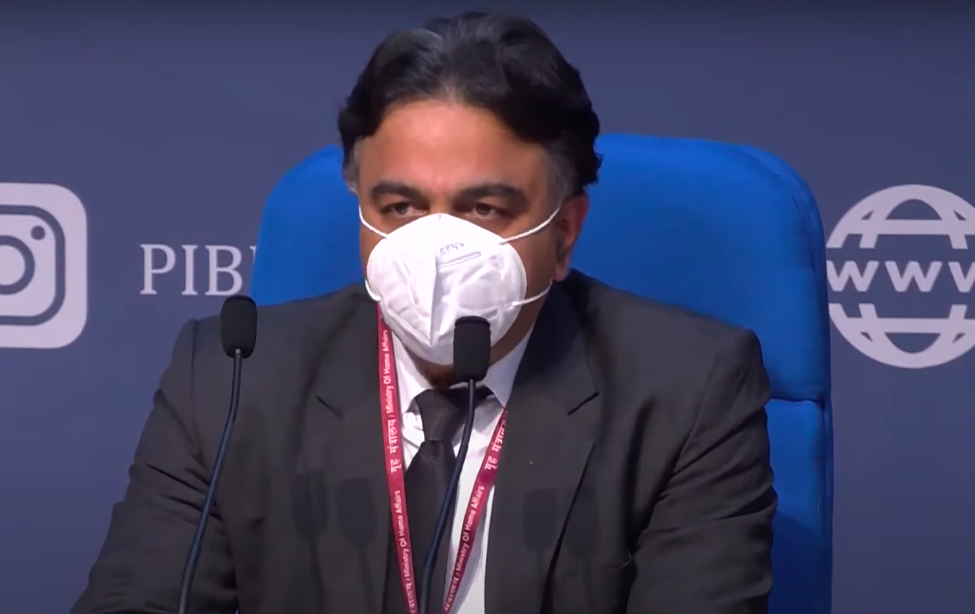
Dr V.G. Somani addressing the press on January 3, 2021. Source: PIB/YouTube.
New Delhi: India’s drug regulator announced on Sunday that the COVID-19 vaccine candidates of Serum Institute of India (SII) and Bharat Biotech have been cleared for “restricted use in an emergency situation”. The regulator’s important announcement comes a day after the subject expert committee (SEC) of the Central Drugs Standards Control Organisation recommended that the two companies’ pitches be approved.
The Drugs Controller General of India (DCGI) Dr V.G. Somani announced in a press conference on January 3 that both firms had submitted data from their respective (and unfinished) clinical trials. SII’s Covishield vaccine candidate and Bharat Biotech’s Covaxin have been cleared for “restricted emergency use”, he said.
SII’s vaccine candidate is derived from the AstraZeneca-Oxford candidate, and Bharat Biotech’s candidate is indigenous, developed in collaboration with the Indian Council of Medical Research and the National Institute of Virology, Pune. Both vaccine candidates have to be administered in two doses and must be stored at 2-8° C.
During the press conference, Somani said SII had submitted safety, immunogenicity and efficacy data generated with 23,745 participants aged above 18 years from overseas clinical studies. The overall vaccine efficacy was found to be 70.42%, he added.
Also Read: India Approves Two Vaccine Candidates, But Let’s Not Pretend Everything Is Okay
While Somani said that the vaccine’s use will be subject to certain “regulatory conditions”, he did not expand on what those conditions might be.
Bharat Biotech has generated safety and immunogenicity data in various animal species, including mice, rats, rabbits and Syrian hamsters, and also conducted “challenge studies” on rhesus macaques and hamsters, the DCGI said. The firm shared this data with the CDSCO, Dr Somani said, along with data from phase 1 and phase 2 clinical trials. In his telling the results have demonstrated that the vaccine is “safe and provides a robust immune response”.
However, these details are not in the public domain. Bharat Biotech said it expected it to be at least 60% effective in November. The company has also not shared safety data in the public domain. As such, Covaxin’s approval has triggered more questions than answers.
The CDSCO accepted the SEC’s recommendation to permit “restricted use in emergency situation in public interest” as an “abundant precaution, in clinical trial mode, to have more options for vaccinations, especially in case of infection by mutant strains”. The firm’s clinical trial underway within the country will continue, a statement from the DCGI’s office said.
Many experts have expressed confusion about the DCGI’s language as well. For example, the phrase “restricted use in emergency situation in public interest” does not find mention in the New Drugs and Clinical Trials Rules 2019, which specifies the processes by which vaccines may be approved for use in the country.
In addition, Dr Somani also responded to a reporter’s question as he was exiting the venue saying he believed the two candidates to be 110% safe – a bizarre claim considering neither Bharat Biotech nor SII have yet to conclude their respective phase 3 clinical trials.
#WATCH I We’ll never approve anything if there’s slightest of safety concern. Vaccines are 110 % safe. Some side effects like mild fever, pain & allergy are common for every vaccine. It (that people may get impotent) is absolute rubbish: VG Somani,Drug Controller General of India pic.twitter.com/ZSQ8hU8gvw
— ANI (@ANI) January 3, 2021
Separately, the DCGI also said his office has accepted the SEC’s recommendation to allow Cadila Healthcare to conduct phase 3 clinical trials with 26,000 participants for its vaccine candidate. According to information shared by the DCGI’s office, this vaccine candidate is safe and has been found to elicit an immune response in phase 1 and 2 clinical trials, when administered intradermally (into the skin) in three doses.
Dr Somani did not take any questions from the media after reading his statement.
Late last year, Prime Minister Modi had visited laboratories operated by Bharat Biotech and SII and check on progress on their respective vaccine candidates. And coinciding with Dr Somani’s announcement, Prime Minister Modi tweeted the ‘Made in India’ angle to both candidates.
It would make every Indian proud that the two vaccines that have been given emergency use approval are made in India! This shows the eagerness of our scientific community to fulfil the dream of an Aatmanirbhar Bharat, at the root of which is care and compassion.
— Narendra Modi (@narendramodi) January 3, 2021
On Saturday, the government performed end-to-end mock drills simulating vaccine administration in all states and Union Territories. The dry runs were conducted at three sites or more in 125 districts and officials were trained on operational guidelines.
Union health minister Harsh Vardhan said that during the first phase of the rollout, the vaccine would be administered free of cost to the highest priority beneficiaries, which included one crore healthcare and two crore frontline workers. The government has also identified 27 crore “priority beneficiaries” – those above 50 years of age plus those with comorbidities – who would be vaccinated until July 2021.

